Content
Alcoholism is a chronic disease that takes months or years of treatment and support to recover from. It takes years to conduct studies on people recovering from alcoholism. That’s why 2017 and 2018 alcohol relapse statistics aren’t available yet. However, studies published in recent years provide a picture of current relapse rates. Having a substance abuse disorder like alcohol use disorder or alcoholism means that you have a chronic health condition, much like diabetes or high blood pressure. As such, alcoholism is never truly cured but is instead managed.
However, less than 10 percent of these adolescents received the treatment that they needed to recover. The proof is in the pudding, demonstrating that there is a gap where people need and want help, but for various reasons, they don’t receive it. Here, we’ll guide you through the three stages of relapse and how to pay attention to relapse symptoms so that you can prevent yourself from slipping back into addiction.
Stages And Symptoms Of Alcohol Relapse
A 2006 study published in the journal Addiction found that 62 percent of people treated for alcoholism through alcohol rehab or Alcoholics alcoholic relapse signs Anonymous maintained recovery after three years. About 43 percent of people who did not receive any form of treatment maintained sobriety.
In addition, we examined interactions between the help status and relapse status groups. Four studies have evaluated the effect of serotonin blockers–zimelidine, citalopram, and fluoxetine on alcohol consumption in humans, each using a double-blind, placebo-controlled design . These agents produced a decrease in alcohol intake and, in some cases, a significant increase in the number of abstinent days. These effects, however, were found among small samples and were short lived. Controlled trials in larger dependent populations are needed before serotonin blockers can provide hope as a possible adjunct for relapse prevention.
How Can A Person Prevent Relapse And Stay Sober?
You stop attending all meetings with counselors and your support groups and discontinue any pharmacotherapy treatments. You may feel loneliness, frustration, anger, resentment, and tension. You make irrational choices and are unable to interrupt or alter those choices. You begin to Alcoholism in family systems think that you can return to social drinking and recreational drug use and you can control it. They are dangerous because you may be tempted to self-medicate them with alcohol or drugs. No one likes the idea of having to return to rehab, but it can quite possibly save your life.
Relapse must be taken seriously, as a return to drug or alcohol abuse can have dangerous — and even deadly — consequences. Similarly, Weisner, Matzger & Kaskutas found that treated alcohol-dependent individuals had higher 1-year non-problem use outcomes (40% versus 23%) than did untreated individuals. Overall, these studies suggest that, especially among individuals who recognize their alcohol problems, treated individuals achieve higher remission rates than do untreated individuals. In active addiction, when you were tired you used alcohol or drugs.
Antisocial personality disorder and alcohol use disorder SAR – Dove Medical Press
Antisocial personality disorder and alcohol use disorder SAR.
Posted: Mon, 19 Apr 2021 07:00:00 GMT [source]
Strategies for recovery will help reduce the risk of relapse. Especially, when provided with the necessary tools, education, and additional resources to make healthy lifestyle changes. Learning coping tools will also assist in helping individuals with their intense emotions and work through different situations and obstacles. Eventually, they will be able to handle triggers as they arise during and after recovery.
Knowing how to respond if a relapse happens is also incredibly important when it comes to maintaining long-term recovery. Research shows that alcohol and opioids have the highest rates of relapse, with some studies indicating a relapse rate for alcohol as high as 80 percent during the first year after treatment. Similarly, some studies suggest a relapse rate for opioids as high as 80 to 95 percent during the first year after treatment. Other substances with notoriously high relapse rates are stimulants and benzodiazepines. Ultimately, relapse is a part of many people’s story, and it doesn’t prevent anyone from finding long-term sobriety.
Do I Need Treatment Again?
Also, I was still in denial that my life was unmanageable and that I could still control my drug use and/or the lifestyle I was living. Learning from my counselor the most knowledgeable thing was that I do have a purpose; I deserve the life I dreamt of as a kid. I’m truly grateful I had the chance to be a part of Discovery Institute and had the counseling I’ve had since coming here. It’s a three-part process that starts in the mind and gradually leads to the physical act of relapse. It’s important to note the three stages of relapse during early recovery and keep them in mind when you’re thinking about using again.
When someone relapses, their addiction is often worse than before. The feelings of shame and guilt further drive the substance abusing behavior in an effort to numb any uncomfortable emotions. Each day the person continues using makes recovery more difficult.
Those looking for a recovery support group after they’ve already sought out addiction treatment may benefit greatly from a 12-step approach. However, people should research their options and determine if a spiritual approach to recovery is ideal for their needs. An effective addiction aftercare program fits a person’s specific needs, and in some cases, a more secular approach to recovery may be preferable. For those struggling with alcohol use disorder, or alcoholism, Alcoholics Anonymous is an international organization of peer groups meet to support each other.
Rates Of Short
However, alcohol addiction relapse can also be an opportunity to work on the issues and triggers that first led to the development of the addiction. For those who have already been in treatment, it might signal that it’s time to try a different approach. If you are looking to learn more about alcohol addiction, visit our trusted resource library. If you struggle with drinking or struggling to maintain your recovery from alcohol addiction, The Recovery Village Drug and Alcohol Rehab can help. Contact our alcohol addiction recovery experts today to learn more.
While you may not know all of your possible triggers at the beginning, it can be a list that evolves over time. Data obtained from each study was independently extracted by two reviewers (L.C. and A.S.) using a standardized extraction form. Post-transplant alcohol relapse occurred in about one-fifth of patients who underwent alcohol-related LT. Psychiatric comorbidities represented the strongest predictor of alcohol relapse. Psychiatric comorbidities monitoring and pre-LT alcohol abstinence for at least 6 months may decrease alcohol relapse after LT. If you or a loved one are struggling with mental health or substance abuse, we can help. But it is fair to assume that your loved one is a bit broken, too. For those who are in recovery, the word “relapse” carries more stigma and shame than it does understanding.

All it takes is a millisecond, being in the wrong place at the wrong time, or just one bad thought that leads to one bad decision. Do not be so confident in your recovery that you are willing to put yourself in risky situations or seek them out to prove to yourself that you can be sober at a party, for example. Alcohol addiction is one of the most common substance abuse problems in the United States. A 2015 National Survey on Drug Use and Health report shows that among adults, nearly 27% admitted to binge drinking in the past month, and 7% of them said they drank heavily in that same month 1. Problematic drinking behaviors such as these may eventually give way to the compulsive patterns of abuse that underlie an alcohol addiction. Other signs of alcohol addiction are persistent cravings or a powerful desire to use alcohol and drinking despite the negative impact and detrimental consequences. Doctors use the term alcohol use disorder to refer to the condition that occurs when alcohol abuse leads to this kind of distress or harm.
The Dangers Of Quitting Drugs Cold Turkey
So a person is quickly forced to take more and more of the drug to achieve the same effects. Then, when that person becomes sober and experiences withdrawal, their body and their tolerance levels react accordingly, pushing their tolerance closer to normal. When a person then relapses on opioids, they take the same increased amount of opioids as they had before and the body isn’t ready to process that amount of drugs. These results add to growing evidence that participation in treatment and/or AA contributes to better short-term alcohol-related outcomes. To find out how well 16-year relapse could be predicted, we constructed a risk for relapse index based on the four risk factors identified in the regression.
- Alcohol relapse is so common because of how accessible drinking is in society and how anything can trigger someone to crave or have the urge to use again.
- Careful evaluation of patients with alcoholic liver disease prior to liver transplantation can identify patients with a high risk of alcohol relapse.
- Similarly, Weisner, Matzger & Kaskutas found that treated alcohol-dependent individuals had higher 1-year non-problem use outcomes (40% versus 23%) than did untreated individuals.
- It also prevents and manages alcohol-related health problems, such as cancer, liver disease, and diabetes.
- Often, a person with AUD has more questions than answers when they start.
When you lose interest in a hobby or you lose a loved one, you might feel the need to have a drink or do drugs to cope. This is why it’s important to manage any depressive symptoms you have by seeing a doctor so that you don’t relapse. It takes constant dedication and support from friends and family to make sure you don’t relapse.
When it turns into addiction, this disease is so powerful, that any type of environment or trigger, big or small can cause someone to relapse. Drinking exacerbates whatever condition a person may be suffering from. Drinking also causes serious health conditions such as cirrhosis .

Some of these different factors may increase the likelihood of alcohol abuse. Unfortunately, many people with drug or alcohol addiction are in denial that they have a problem in the first place. It usually takes the concern and efforts of family and friends to encourage people to go to rehab. Other techniques to prevent relapse include practicing regular self-care, participating in relapse prevention programs, and focusing on one day at a time. The more relapse prevention activities a person participates in, the more likely it is that he or she will remain sober. Another way to prevent alcohol relapse is to participate in aftercare recovery groups such as 12-step meetings. Support groups provide a safe place to share how a person is feeling and to discuss triggers and difficult emotions with other people.
Take The First Step Into Recovery Today
Drinking alcohol persists despite being in situations that are particularly hazardous to one’s health. The chronic use of alcohol is affecting a person’s ability to function, and complete tasks at home, work, or school. Call our confidential hotline to speak with an addiction specialist now.
The literature on alcohol relapse post-transplantation has reported a wide range of alcohol relapse rates, which might be due to different definitions of alcohol relapse. Dew et al. reported that the average rate for alcohol relapse after LT was 5.6 cases per 100 patients per year for any alcohol relapse and 2.5 cases per 100 patients per year for heavy alcohol relapse . The authors suggested that a significant proportion of patients who returned to any alcohol drinking then became heavy drinkers, which led to a significant harm to LT recipients . Although medical detox can get rid of the physical dependence on drugs or alcohol, aftercare is crucial in helping change the way you think about using substances. Another problem is that patients are not required to finish their treatment program; they can leave at any time. As a result, many recovering addicts don’t get the help they need. Programs like 12-step support groups, group therapy and motivational interviewing can help patients maintain sobriety and make them less likely to relapse.

